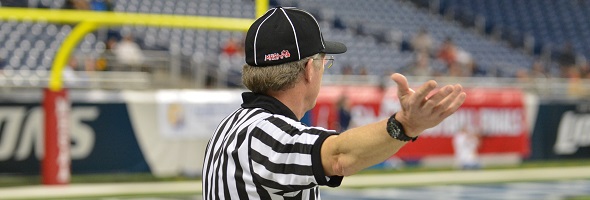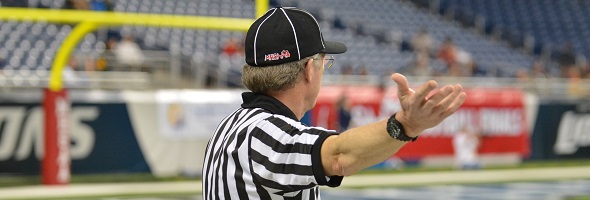
Be the Referee: Tackle Box
September 16, 2014
This week, MHSAA assistant director Mark Uyl discusses the differences between high school and college/NFL rules when it comes to a quarterback's movements within and outside the "tackle box."
"Be the Referee" is designed to help educate people on the rules of different sports, to help them better understand the art of officiating and to recruit officials. The segment can be heard on Mondays, Wednesdays and Fridays during the school year on The Drive With Jack Ebling on WVFN-AM, East Lansing.
Below is this week's segment - Tackle Box - Listen
Today we are going to talk about the rules that govern the quarterback, specifically when the quarterback is being rushed and is looking to throw the ball away and avoid the sack.
Under both pro and college rules, they have what’s called the tackle box. When the quarterback gets outside of the original position of the offensive tackles and throws the ball and it reaches the original line of scrimmage, there is never a foul for intentional grounding. However, under high school rules there is no such thing as a tackle box.
If the quarterback is either in pocket or scrambles outside of the pocket and now is trying to throw that ball away to avoid the sack, there always must be a receiver in the vicinity of the pass to avoid an intentional grounding foul.
Past editions
Aug. 25 - Targeting - Listen
Sept. 4 - Concussions - Listen
Sept. 11 - Pass Interference - Listen

Be the Referee: Concussion Protocol
September 4, 2014
This week, MHSAA assistant director Mark Uyl explains the football official's role in making school personnel aware that an athlete may have sustained a concussion.
"Be the Referee" is designed to help educate people on the rules of different sports, to help them better understand the art of officiating and to recruit officials. The segment can be heard on Mondays, Wednesdays and Fridays during the school year on The Drive With Jack Ebling on WVFN-AM, East Lansing.
Below is this week's segment - Concussions - Listen
Today we are going to talk about concussions. It is important to know that a game official will never make a diagnosis of whether or not an athlete has suffered a concussion. However, those game officials do have an important role to play when it comes to keeping athletes safe.
Officials must be not only aware during the play but especially just after the play for any athlete that appears to be disoriented, unsteady on their feet, or even appears dizzy to where the game must be stopped immediately, the coaching staff notified and then officials need to allow the coaches, working with the school's medical personnel, to make the best decision for the athlete involved.
Past editions
Aug. 25 - Targeting - Listen

